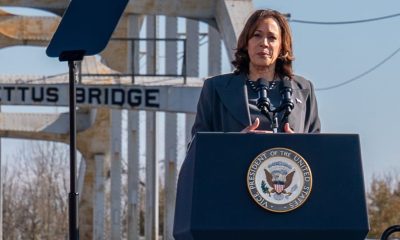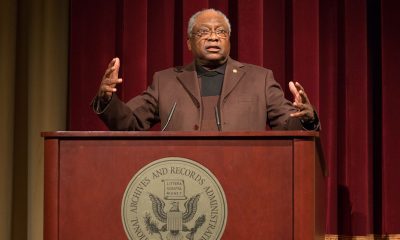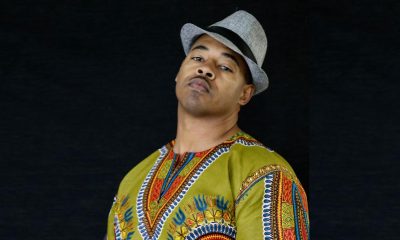Economy
On King Holiday Commemoration: 600 Black Legislators Resolved To Push Policies For Economic Justice
THE SEATTLE MEDIUM — It was three years ago that a group of national business leaders launched a movement called Black Wealth 2020 partially based on the economic vision articulated by Dr. Martin Luther King Jr.
By Hazel Trice Edney
(Trice Edney Wire) – It was three years ago that a group of national business leaders launched a movement called Black Wealth 2020 partially based on the economic vision articulated by Dr. Martin Luther King Jr.
King said in his final speech on April 3, 1968: “It’s all right to talk about streets flowing with milk and honey, but God has commanded us to be concerned about the slums down here and his children who can’t eat three square meals a day. It’s all right to talk about the new Jerusalem, but one day, God’s preacher must talk about the new New York, the new Atlanta, the new Philadelphia, the new Los Angeles, the new Memphis, Tennessee.”
As America commemorates another Martin Luther King Jr. National Birthday Holiday Jan. 21, an organization of Black legislators have adopted a resolution to begin spreading the Black Wealth 2020 principles and initiatives with an aim to grow the economic justice movement that King started in Memphis just before he was assassinated April 4, 1968.
The National Black Caucus of State Legislators (NBCSL), a 600-member group of local and state Black elected officials, has encouraged its members to form Black Wealth 2020 economic task forces and adopted a resolution to promote its economic agenda in 2019.
“State legislators can play a critical role in the sustainability of communities through policy,” said New York State Senator James Sanders Jr., who introduced and shepherded the resolution during the NBCSL’s 42nd Annual Legislative Conference that concluded Dec. 1. “This initiative aims to financially empower the Black community in the areas of home and business ownership as well as to broaden opportunities for Black financial institutions. Under those conditions, I believe we must do more than announce these goals aloud, but work to firmly cement them throughout America in the form of solid legislation, so they can truly flourish.”
This means the NBCSL, which represents 60 million people in 45 states, the U. S. Virgin Islands and the District of Columbia, will spend the next two years – and beyond – prioritizing policies that enhance Black economic growth through business ownership, homeownership and Black banking.
Sanders is chairman of the New York State Senate Banking Committee. He also leads the Senate Democratic Conference’s Task Force on Minority and Women-owned Business Enterprise.
Sanders continues, “As we approach Rev. Dr. Martin Luther King Jr. Day, let us remember that he was a pioneer in this area, planting roots with his ‘Poor Peoples Campaign,’ which propelled the economic justice movement begun in Memphis. I am proud to aid in the continuation of Dr. King’s vision. I look forward to working with my colleagues in government and also the private sector to further assist people of color.”
The resolution is posted in its entirety at NBCSL.org.
The passage of the resolution represents the next steps of a promise made by Rep. Greg Porter, NBCSL’s immediate past president, during his speech at the Black Wealth 2020 second anniversary luncheon last year. He called for unity behind the Black Wealth 2020 vision.
The backing of the legislators reinvigorates and expands the movement, says former National Bankers Association President Michael Grant, one of Black Wealth 2020’s founders and chief spokespersons.
“The National Black Caucus of State Legislators, through exemplary leadership of Representative Greg Porter and State Senator James Sanders, helped the Black Wealth 2020 coalition take a quantum leap forward with the passage of Resolution BED-19-21. The NBCSL connects Dr. Martin Luther King Jr.’s vision of economic justice to a modern day movement that is making wealth-building throughout the Diaspora one of our highest single priorities.”
Other Black Wealth 2020 founders are Ron Busby, president/CEO of the U.S. Black Chambers Inc. and Jim Winston, president of the National Organization of Black Owned Broadcasters.
“Whereas, the economic goals of Black wealth 2020 have historic roots, referencing to when Dr. Martin Luther King Jr. had launched the ‘Poor People’s Campaign’, an economic justice movement that had begun in Memphis; the founders of Black Wealth 2020 view their work as a continuum of Dr. King’s vision, with a unique contemporary strategy for sustainability,” states the resolution.
“Therefore, be it resolved, the National Black Caucus of State Legislators (NBCSL), encourages state policymakers and their membership to establish a Black Wealth 2020 economic task force designed to develop economic building blocks for the African-American population to addresses racial wealth gap.”
The NBCSL, aiming even higher with its goals to spread the initiatives, said it will send a copy of the resolution to the “President of the United States, the Vice President of the United States, members of the United States House of Representatives and the United States Senate, and other federal and state government officials as appropriate.”
At least a dozen other major Black organizations have either joined or expressed support for the Black Wealth 2020 economic initiatives. The goals seek to untangle a web of economic injustices including the following statistics outlined in the resolution:
- There are only 2.6 million Black-owned businesses in the United States, whereas the U.S. black population is estimated to be over 40 million, according to the National Black Chamber of Commerce.
- 27.6 percent of black applicants for conventional mortgage loans were denied in 2013 while White applicants were denied only 10.4 percent of the time, according to the National Association of Real Estate Brokers.
- The number of Black-owned banks operating ln the U.S. has been dropping steadily for the past 15 years and fell to 23 last year, the lowest level in recent history, according to the Federal Deposit Insurance Corp.
- The median wealth of White households is 20 times that of Black households.
Among the successful initiatives of Black Wealth 2020 in its third year are an agreement between the Bishops of the African American Episcopal Church and Black-owned banks and a credit card established by the Black-owned Liberty Black of New Orleans and the U. S. Black Chamber Inc. The NBCSL resolution points out that such initiatives will empower a nation where the pain of poverty and economic disparities are pervasive.
The resolution concludes: “Be it further resolved that the NBCSL urges state representatives to develop and implement state and community-based intervention programs aimed to address historical and systematic barriers to homeownership, small business and access to capital.”
This article originally appeared in The Seattle Medium.
Business
Black Business Summit Focuses on Equity, Access and Data
The California African American Chamber of Commerce hosted its second annual “State of the California African American Economy Summit,” with the aim of bolstering Black economic influence through education and fellowship. Held Jan. 24 to Jan. 25 at the Westin Los Angeles Airport Hotel, the convention brought together some of the most influential Black business leaders, policy makers and economic thinkers in the state. The discussions focused on a wide range of economic topics pertinent to California’s African American business community, including policy, government contracts, and equity, and more.

By Solomon O. Smith, California Black Media
The California African American Chamber of Commerce hosted its second annual “State of the California African American Economy Summit,” with the aim of bolstering Black economic influence through education and fellowship.
Held Jan. 24 to Jan. 25 at the Westin Los Angeles Airport Hotel, the convention brought together some of the most influential Black business leaders, policy makers and economic thinkers in the state. The discussions focused on a wide range of economic topics pertinent to California’s African American business community, including policy, government contracts, and equity, and more.
Toks Omishakin, Secretary of the California State Transportation Agency (CALSTA) was a guest at the event. He told attendees about his department’s efforts to increase access for Black business owners.
“One thing I’m taking away from this for sure is we’re going to have to do a better job of connecting through your chambers of all these opportunities of billions of dollars that are coming down the pike. I’m honestly disappointed that people don’t know, so we’ll do better,” said Omishakin.
Lueathel Seawood, the president of the African American Chamber of Commerce of San Joaquin County, expressed frustration with obtaining federal contracts for small businesses, and completing the process. She observed that once a small business was certified as DBE, a Disadvantaged Business Enterprises, there was little help getting to the next step.
Omishakin admitted there is more work to be done to help them complete the process and include them in upcoming projects. However, the high-speed rail system expansion by the California High-Speed Rail Authority has set a goal of 30% participation from small businesses — only 10 percent is set aside for DBE.
The importance of Diversity, Equity and Inclusion (DEI) in economics was reinforced during the “State of the California Economy” talk led by author and economist Julianne Malveaux, and Anthony Asadullah Samad, Executive Director of the Mervyn Dymally African American Political and Economic Institute (MDAAPEI) at California State University, Dominguez Hills.
Assaults on DEI disproportionately affect women of color and Black women, according to Malveaux. When asked what role the loss of DEI might serve in economics, she suggested a more sinister purpose.
“The genesis of all this is anti-blackness. So, your question about how this fits into the economy is economic exclusion, that essentially has been promoted as public policy,” said Malveaux.
The most anticipated speaker at the event was Janice Bryant Howroyd known affectionately to her peers as “JBH.” She is one of the first Black women to run and own a multi-billion-dollar company. Her company ActOne Group, is one of the largest, and most recognized, hiring, staffing and human resources firms in the world. She is the author of “Acting Up” and has a profile on Forbes.
Chairman of the board of directors of the California African American Chamber of Commerce, Timothy Alan Simon, a lawyer and the first Black Appointments Secretary in the Office of the Governor of California, moderated. They discussed the state of Black entrepreneurship in the country and Howroyd gave advice to other business owners.
“We look to inspire and educate,” said Howroyd. “Inspiration is great but when I’ve got people’s attention, I want to teach them something.”
Bay Area
Port of Oakland Commission Votes to Change Oakland Airport to ‘San Francisco Bay Oakland International Airport’
The Port of Oakland Commission voted unanimously to change the name of Metropolitan Oakland International Airport to San Francisco Bay Oakland International Airport at a commission meeting Thursday afternoon. The Port initially announced the name change on March 29, claiming that the change will attract more passengers and enhance the airport’s visibility. They contend that the airport often gets neglected by the public’s lack of knowledge of Oakland’s proximity to San Francisco.
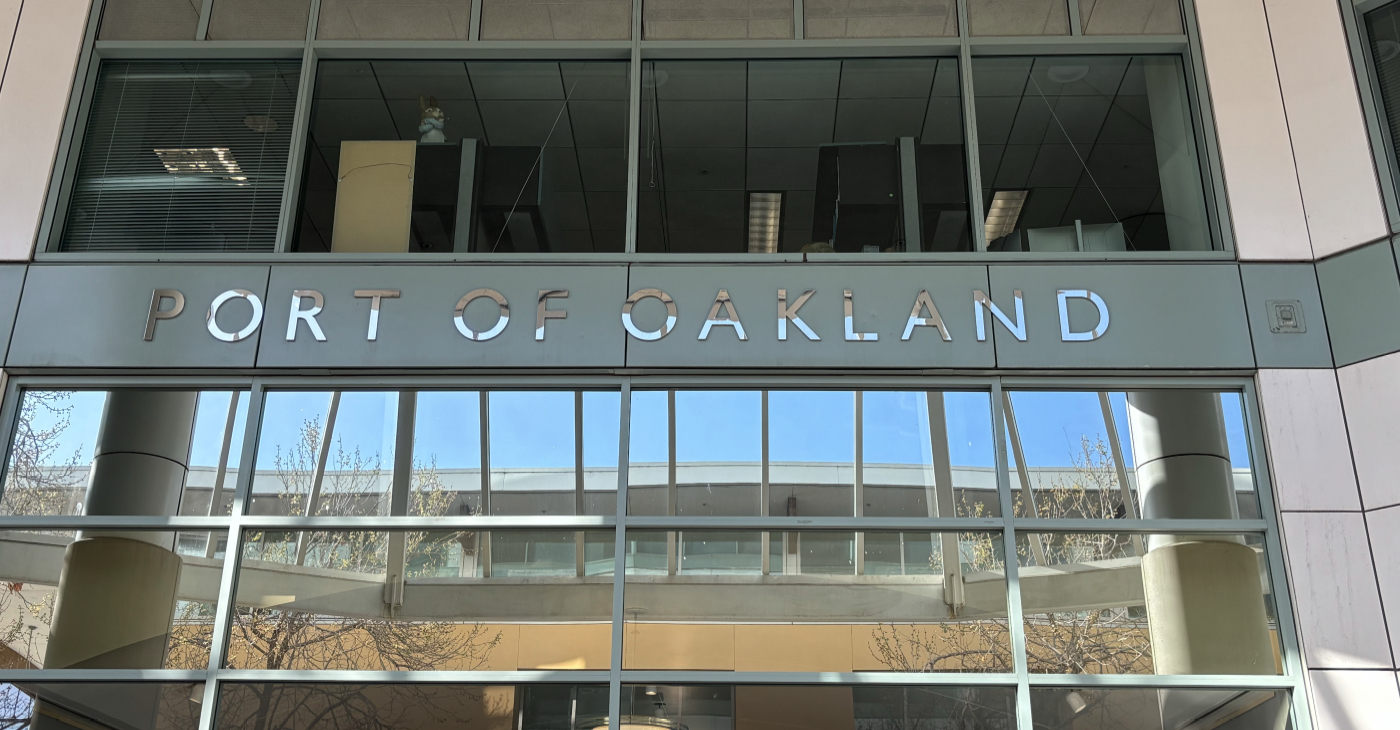
By Magaly Muñoz
The Port of Oakland Commission voted unanimously to change the name of Metropolitan Oakland International Airport to San Francisco Bay Oakland International Airport at a commission meeting Thursday afternoon.
The Port initially announced the name change on March 29, claiming that the change will attract more passengers and enhance the airport’s visibility. They contend that the airport often gets neglected by the public’s lack of knowledge of Oakland’s proximity to San Francisco.
“We want people to know where Oakland is and how beautiful our city is. We want them to visit, we want them to spend their money, and we want to keep our money into our local economy,” Port Commission President Barbara Leslie said at the meeting.
The commissioners shared anecdotal experiences and research to explain how this new name change will elevate and add to the growth of Oakland, not take away from their Bay Area neighbors.
The Port claimed that local residents had been asking for more options in domestic and international flights, but in order to do that, outside travelers need to be aware of Oakland’s presence first.
Since the announcement of the new name, San Francisco leaders strongly opposed the suggestion for a change, the City Attorney going as far as threatening legal action.
SF City Attorney David Chiu announced Monday that his team sent a letter to the Port of Oakland, writing that if Oakland goes forward with the name change, the city will go forward with a lawsuit to prevent the use of their trademarked name.
San Francisco owns U.S. federal trademark registrations for the marks “San Francisco International Airport”, the letter says.
Chiu further claimed that the name change will only cause confusion and chaos for travelers who are used to seeing the San Francisco name in the SFO trademark.
“We want to see the entire Bay Area thrive as a tourist destination and expand our offerings to visitors, but this proposal is not a legal or practical way to go about it. If Oakland moves forward with this proposal, San Francisco will pursue legal action to prevent misuse of our trademark,” Chiu said.
SF Mayor London Breed joined Chiu’s letter, stating that Oakland does not need to add the internationally popular city to its brand in order to grow its services.
“[Oakland] is rich in culture and wonderful people and has its own unique identity. It does not need the name San Francisco as part of its airport to stand out,” Breed wrote.
The Port defended its proposed actions, saying that if the vote did go forward, they would “take all appropriate measures to defend its right to use this accurate geographic identifier.”
“The proposed name modification will clarify, not confuse. The new name identifies where OAK is actually located, which is on the San Francisco Bay,” a spokesperson said on behalf of the Port.
Support for the name change extends beyond the Port. Several regional leaders, airlines and community members have come out in support of the name change, including Oakland Mayor Sheng Thao.
“This adjustment isn’t just about signage—it’s about inviting travelers to discover all that Oakland and the region have to offer. From our local dining scene to unique shopping spots and cozy hotels, there’s something here for everyone. Let’s work together to ensure that Oakland Airport continues to serve as a welcoming gateway for visitors and a source of pride for our community,” Thao said.
Because of public outcry amongst residents and leaders in Oakland and San Francisco before and during the Commission meeting, the Board decided to extend the second reading for the proposed name change from the end of April to the first meeting in May. This decision will allow commissioners to connect with community groups and leaders over their concerns for the change.
The Port Commission is scheduled to hold a second reading of the proposed name change on May 9.
Business
V.P. Kamala Harris: Americans With Criminal Records Will Soon Be Eligible for SBA Loans
Speaking in Las Vegas on Jan. 27, Vice President Kamala Harris announced a forthcoming federal rule that will extend access to Small Business Administration (SBA) loans to Americans who have been convicted of felonies but have served their time. Small business owners typically apply for the SBA loans to start or sustain their businesses.
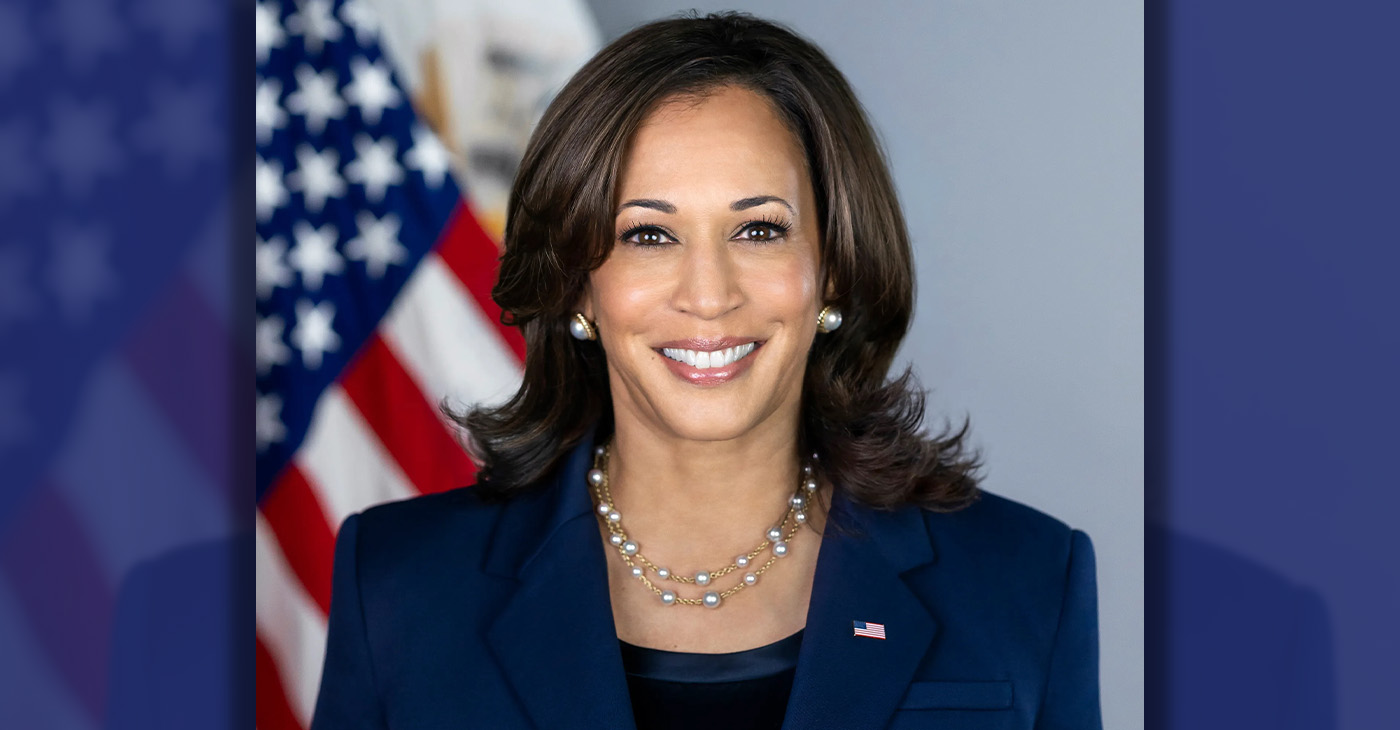
By California Black Media
Speaking in Las Vegas on Jan. 27, Vice President Kamala Harris announced a forthcoming federal rule that will extend access to Small Business Administration (SBA) loans to Americans who have been convicted of felonies but have served their time.
Small business owners typically apply for the SBA loans to start or sustain their businesses.
Harris thanked U.S. Rep. Steven Horsford (D-NV-04), the chair of the Congressional Black Caucus, for the work he has done in Washington to support small businesses and to invest in people.
“He and I spent some time this afternoon with business leaders and small business leaders here in Nevada. The work you have been doing to invest in community and to invest in the ambition and natural capacity of communities has been exceptional,” Harris said, speaking to a crowd of a few hundred people at the Brotherhood of Electrical Workers Hall in East Las Vegas.
On her daylong trip, Harris was joined by Horford, SBA Administrator Isabella Guzman, Interim Under Secretary of Commerce for Minority Business Development Agency (MBDA) Eric Morrissette, and Sen. Catherine Cortez Masto (D-Nev).
“Formerly incarcerated individuals face significant barriers to economic opportunity once they leave prison and return to the community, with an unemployment rate among the population of more than 27%,” the White House press release continued. “Today’s announcement builds on the Vice President’s work to increase access to capital. Research finds that entrepreneurship can reduce recidivism for unemployed formerly incarcerated individuals by as much as 30%.”
-

 Activism4 weeks ago
Activism4 weeks agoOakland Post: Week of March 27 – April 2, 2024
-

 #NNPA BlackPress4 weeks ago
#NNPA BlackPress4 weeks agoCOMMENTARY: D.C. Crime Bill Fails to Address Root Causes of Violence and Incarceration
-

 #NNPA BlackPress4 weeks ago
#NNPA BlackPress4 weeks agoMayor, City Council President React to May 31 Closing of Birmingham-Southern College
-

 #NNPA BlackPress4 weeks ago
#NNPA BlackPress4 weeks agoBeloved Actor and Activist Louis Cameron Gossett Jr. Dies at 87
-

 Community1 week ago
Community1 week agoFinancial Assistance Bill for Descendants of Enslaved Persons to Help Them Purchase, Own, or Maintain a Home
-

 Activism3 weeks ago
Activism3 weeks agoOakland Post: Week of April 3 – 6, 2024
-

 Business1 week ago
Business1 week agoV.P. Kamala Harris: Americans With Criminal Records Will Soon Be Eligible for SBA Loans
-

 Activism2 weeks ago
Activism2 weeks agoOakland Post: Week of April 10 – 16, 2024





